The main question: what is the best way to heat? Types of heat generators for air heating
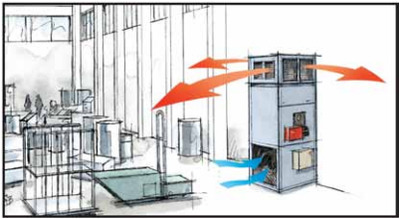
A heat generator is a heating unit whose main task is to obtain heating the coolant by burning several types of fuel.
Most of these devices are used for heating premises, as well as for obtaining hot water in buildings for various purposes.
Advantages of heat generators for air heating
The high cost of electricity has a negative impact on the popularity of heating equipment, including heat generators. However, these devices have a number of positive aspects, for which they are worth buying. Most often, heating generators are used in houses with a small area. They can be used not only as a heating mechanism, but also as a hot water heater.
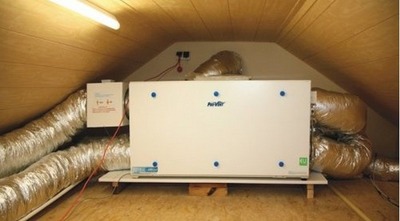
Heat generators are popular with consumers. The following factors contribute to this:
- Heat flow propagation over long distances.
- Variety of models with different power ranges.
- Possibility of changing the fan speed heater.
- High utility factor equipment.
- Long battery life devices.
- Low noise level at work.
The device structure
According to their functions, these devices practically no different from heat guns, except stationarity. The simplest heat generator consists of a fan, a combustion chamber and an air heat exchanger. Generators can operate on various fuels. The most common devices are gas and diesel. If a burner is used in the design, then oil is used as fuel.
Operating principle
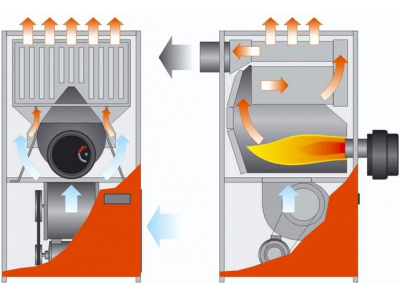
After the fuel enters the combustion chamber of the generator, the resulting hot gases enter the heat exchangerThese gases are then directed into the chimney.
Heating occurs by blowing air through the heat exchanger, obtained using a fan. Warm air spreads by premises through the ventilation system devices.
New models of heat generators are equipped with special mechanisms for removing the resulting condensateThis modification is useful in cases where the device is subject to frequent temperature changes.
Varieties
The main difference between the models of heat generators is in the form of fuel, used for heating. And there are also differences in heating element. Such elements are air or water.
Diesel
Devices of this type work on diesel fuel or kerosene. Diesel heat generators are suitable for heating large spaces industrial type. Fuel supply is carried out in two ways: drip or using a nozzle, spraying fuel across the combustion zone.
In addition to diesel fuel, generators equipped with a special burner use oils and fats of vegetable origin. However, this type of fuel constantly produces slag, which over time have to be cleaned, which leads to device downtime.
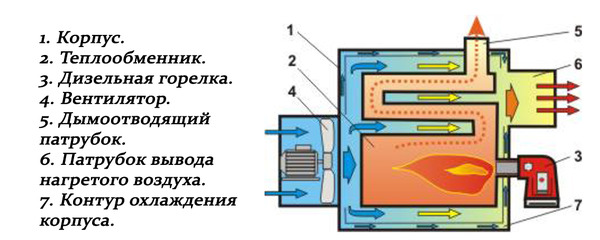
Photo 1. Diagram of the diesel heat generator. The main parts, movement of cold and warm air are indicated.
Gas
This type is designed for a constant supply of hot air to the premises. Gas generators are installed vertically. The heat exchanger receives the maximum amount of heat from combustion products, thereby reducing the volatility of smoke. That is why heat generators of this type require the mandatory installation of a fan, which improves exhaust. Efficiency gas units reaches 90%.
Important! When purchasing gas models of heat generators, it is worth considering it low pressure working capability gas.
Universal
This type of generators similar to diesel devices. However, in the case of universal devices, fuel you can use vegetable fatsThe power of a diesel generator is much higher compared to equipment running on oils and vegetable fats.
Vortex
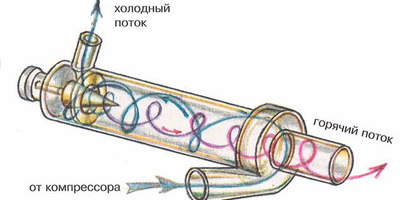
It is different complexity of designThe operating principle is based on the vortex effect, in which gas or liquid splits into two parts and forms a vortex.
During this process, an active increase in temperature is observed in the combustion chamber.
How it works on coal, wood, coke
This type of heating unit uses as fuel various types of solid fuel: coal, firewood, coke. Many consumers use special waste obtained after processing plants. The most important factor for good heating of the device is the heat transfer of solid fuel, so most buyers use fuel with the highest efficiency.
Most solid fuel generators are capable of producing Efficiency at 90%. The devices emit heat throughout 5-8 hours, and it is enough one bookmark solid fuel.
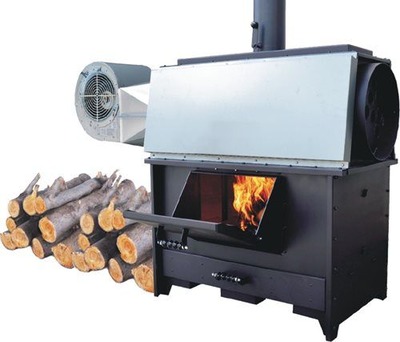
The most common boilers are those made from cast iron or steelCast iron heat generators are more popular, as this metal is capable of releasing heat for a long time.
However, this material is quite brittle, as cast iron prone to overheating, and as a result, cracks form on the boilers.
Steel boilers are less susceptible to temperature changes, but have a number of other disadvantages.
When working with these heat generators, it is worth constantly load fuel into the chamber combustion. Solid fuel equipment requires special and constant attention from a person, but at the same time, their convenience lies in the availability of solid fuel.
Features of liquid fuel and gas heat generators
This type of heating unit can operate on natural gas or diesel. The latest models have quick fuel change functionFor this purpose, a special burner and an additional control cabinet are provided.
This type of generators works on the following principle: fuel enters the combustion chamber, where it mixes with air supplied through the ventilation, after which the heated air passes through the heat exchanger and is distributed throughout the room.
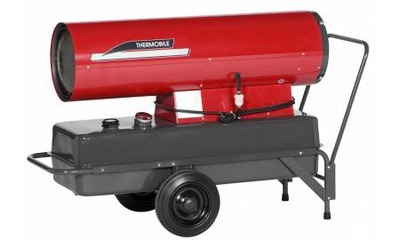
The peculiarity of liquid fuel heat generators is that ease of useTo start heating, it is enough to fill with fuel and start the device. And also it is noted nhigh price.
Such heaters mobile, so their use will not cause any unnecessary problems.
Useful video
The video demonstrates a greenhouse air heating system using a GRV wood-fired heat generator.
Recommendations for selection
Before purchasing a heat generator, it is worth decide on the parameters, for which he will be responsible. It is selected in advance fuel type, on which the heat generator will operate. Gas is the cheapest.
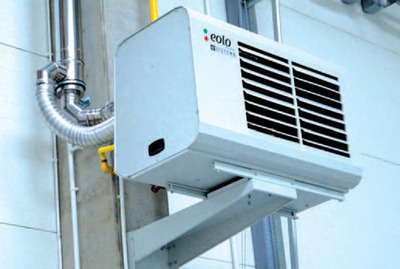
If the reliability of the device is important, then you should pay attention to diesel generators. They are also effective, but have the disadvantage of being noisy.
Electric generators do not require special permits, but are not popular with consumers due to the high cost of electricity
Power rating is the main factor when choosing heating devices. If you need a unit for private use, you should not buy models that generate excess energy.







Comments